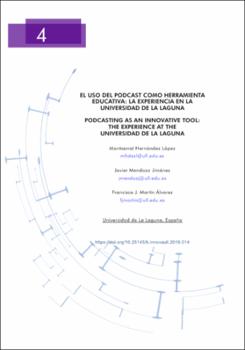El uso del podcast como herramienta educativa: la experiencia en la Universidad de La Laguna
Date
2019Abstract
De los diferentes métodos que existen para innovar en educación, algunos requieren
del uso de las nuevas tecnologías, mientras que otros se centran en herramientas
más tradicionales. El podcasting se encuadra dentro del primer grupo. La palabra
«podcast» es el resultado de combinar el nombre del reproductor Ipod de Apple y el
concepto general de difusión (broadcasting en inglés). El podcast en la educación se
ha usado fundamentalmente como una manera de sustituir las clases presenciales
(O’Bannon, Lubke, Beard, & Britt, 2011). En este estudio, se ha usado el podcasting
en dos grupos diferentes: 31 estudiantes del primer año del Grado de Pedagogía y
39 estudiantes del cuarto año del Grado de Turismo de la Universidad de La Laguna.
A los estudiantes se les enseñaron las nociones básicas de podcasting, y pudieron
conocer ejemplos prácticos antes de realizar su propio podcast en grupos de cuatro
o cinco personas. En el caso de los estudiantes de Pedagogía, el profesor eligió el
tema, mientras que los estudiantes de Turismo tuvieron más libertad para decidir.
Las impresiones de los estudiantes se midieron mediante una encuesta que se estructuró
en cuatro aspectos: la evaluación de la experiencia en general, los efectos
percibidos entre compañeros, los efectos percibidos en el proceso de aprendizaje, y
la voluntad de ampliar la experiencia. Los resultados muestran que ha habido una
satisfacción general con la experiencia, pero también que la evaluación presenta
diferencias entre los dos grupos. There are different ways of innovating in education. Some of them need the use of
new technologies while others are more focus on more traditional tools. Podcasting
can be categorized within the first group. The word «podcast» is the result of the
combination of the Apple device Ipod and the general concept of broadcasting.
The use of podcast in education has been focused mainly as a way of substituting
lectures (O’Bannon, Lubke, Beard, & Britt, 2011). In this study, we use podcasting
within two different groups: 31 students from the first year of the degree on Pedagogy
and 39 students from the first year of the degree on Tourism at the Universidad de
La Laguna. Students were taught the basic notions of podcasting and confronted
with practical examples before making their own podcast in groups of four or
five people. In the case of the students of Pedagogy, the topic was chosen by the
professor while more freedom was given to the students of the tourism degree. A
survey focusing on four aspects: the assessment of the experience in general, the
perceived effects among peers, the perceived effects on the learning process and
the willingness to enlarge the experience, was sent to the students to evaluate the
experience. The results show a general satisfaction with the experience and some
differences among the defined groups.






